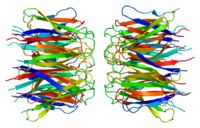
Photo from wikipedia
Acute myeloid leukemia is characterized by recurrent somatic mutations in epigenetic modifier genes like DNA methyltransferase 3A (DNMT3A). Mutations in DNMT3A are commonly seen in older patients who are unfit… Click to show full abstract
Acute myeloid leukemia is characterized by recurrent somatic mutations in epigenetic modifier genes like DNA methyltransferase 3A (DNMT3A). Mutations in DNMT3A are commonly seen in older patients who are unfit for intensive chemotherapy and thus associated with unfavorable outcomes. Recent clinical trials have shown low-intensity regimens of nucleoside analogs (cytarabine and cladribine), to be effective in elderly AML patients, particularly those with DNMT3A mutations. Additionally, previous gene expression studies in DNMT3A cells uncovered signatures suggestive of replication stress and a resultant G2/M checkpoint adaptation. We hypothesized that this can be harnessed as a therapeutic vulnerability. We confirmed differential sensitivity to cytarabine in various model systems, with and without mutant DNMT3A, both in vitro and in vivo. We also observed that the cells with DNMT3A mutations accumulated more DNA damage, with the persistence of the intra S-phase checkpoint activation and elevated levels of activated p53. While DNMT3A-mutant cells remained proficient in engaging DNA double-strand break repair mechanisms, we observed impaired chromatin recruitment of proteins involved in nucleotide excision repair, after cytarabine treatment. Consistently, the DNMT3A-mutant cells displayed a higher rate of replication fork collapse after cytarabine wash-out. Despite persistent unrepaired DNA damage, the DNMT3A mutant cells were able to progress through mitosis, eventually leading to mitotic catastrophe. Consistent with these findings, transcriptomic analysis identified dysregulation of pathways related to cell cycle, DNA damage, and repair. Our studies aim to gain a better understanding of the role played by DNMT3A in modulating sensitivity to clinically relevant replication stalling drugs and thus making it a suitable approach to treat this poor prognosis subtype of AML.
Journal Title: Experimental Hematology
Year Published: 2020
Link to full text (if available)
Share on Social Media: Sign Up to like & get
recommendations!